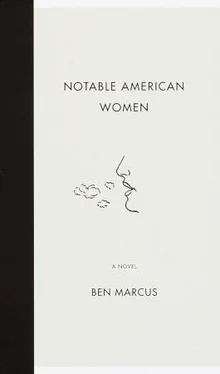Make no mistake; I do remember your early work, if this consoles you at all, though my intention is to be correct, rather than to comfort you. It was fatherly of you to suit up in the body bellows yourself before apprenticing Ben to the project, though, if you’ll recall, young Ben steered himself well clear of his thus-attired father, and even I suffered more than my typical indifference touching you that month (yet the bellows did provide a difficulty that I had previously found your body to lack: Navigating the apparatus made me impatient enough to almost desire you, when your body was rendered inaccessible due to the wires that bound it). In those days, you could barely breathe, and often lay gasping on the floor, your eyes tearing, your skin a flat and terrible shade of blue. That was when our eroticism followed a medical model, me nursing you as though you were a huge and faulty mechanical bird, come crashed near my home, brave and stupid and near death, allowing the hardest kind of love, which would not have to be backed up in the morning. I could mythologize you beyond a walking mediocrity, a flesh-made disappointment. You were my broken machine, a cage with blood flowing through it.
It is true that when you finally shed the bellows that early spring day down at the learning pond, there was something buoyant, if spastic, to your step, an odd and mismanaged freedom your body struck with the air, as though you would be more at home ballooning over Ohio alongside the clouds, a man to lead the weather out of our lives for good, some sort of pied piper pulling wind behind him. You had clearly become stronger, but it was not clear to what end, and this sums you up entirely: intriguing and original upon first glance, yet useless and vain in the end, a reminder of another pointless way life could have gone, and actually did go, but not before, thankfully, thankfully, I altered my own course wide, wide, wide from you, and got myself the hell out of your wrongful way.
It puts me in mind of an instructive moment when I was a girl. There was a boy who was a runner, whose mother wanted terribly for him to win the races. Every morning we saw him jogging in his medical shorts through our neighborhood, a tall boy with a father’s portion of hair on his arms. While we girls were hidden in greatcoats, our scarves wired around us and hats stoppered on our heads, foolish lunches handed over that we would later trade for candy, this boy was steaming with fog as he ran down our streets, just about on pace with the cautious little cars that boxed us up to school. But all of the boy’s training didn’t put him ahead, because there was inevitably some other boy in another town who could run faster, and did, repeatedly, in race after race. Our boy was not a winner, and his huge desire to win only seemed to embarrass everybody, because his confidence in himself was so inaccurate.
Then, revelation, his mother decided to handicap his training so that during races he would have more power. The first handicap was an oxygen tank that limited his breath. Come race time, having shucked his gear, he was not only pounds lighter but it was as if he had a sudden third lung, a power boost akin to cutting gills into his ribs. After that, he ran like an escaped lung patient, the tank on his back bobbing like an oversized coffee thermos.
He was faster, but still not enough.
Next, she hooked a cart to her boy, had him run like a mule carrying fruit to market. Except instead of fruit there was a man in the back of that cart who did things to impede the boy’s progress.
Things?
He heckled him. He pulled on his “reins.” Objects were tossed in his path. There was some occasional tackling.
The cart, too, failed to improve his performance, though it certainly complicated it and introduced new ways for him to thrive. Had there been a cart-pulling race, our boy would have taken first place. He could run under duress. If there was ever a war, for instance. Et cetera.
Next, she abandoned constraining her son’s body and took him off the roads entirely. She went in for visualization, had him picturing stuff that hadn’t happened, to prepare his body for when it would. He was entirely on blocks, stretching out his brain. Our boy stopped running down our streets and we no longer saw him, except when he was a normal citizen in the classroom, plain and powerless. I remember how disappointed I felt watching him do math. I refused to accept him as a citizen, so dull in his school uniform. Someone said that each day before and after school he sat in a “running room” his mother had designed, thinking about running. I pictured his brain fat with thought, his scalp pale, his drumstick calves pulsing with unbidden twitches.
The result at his next race was surprising. He was serene, calm, sort of floating along, driven not by his legs, it seemed, but by some strange current of energy the air had sent into him alone on the racing course. A mind-powered runner. It was beautiful to watch him. If you squinted, you could almost see thin strings of light feeding his muscles as he ran. He had grown slightly thick at the waist, and his legs had lost their veiny, snakelike strength, yet the other runners looked crippled next to him, awkward and near death, as though he were the only man on a gassed battlefield who could breathe. He brought a lyricism to the art of motion that made everyone at the race nervous to even try to walk. I felt stupid and ashamed and my hips ached. It hurt just to stand there. I creaked and cracked on my sockets as though my bones were made of cookie. The result of the race? His original style proved unwinning. He came in third. Speed seemed irrelevant to his gestural fluidity. He was getting worse.
His mother was perplexed. She had fetishized his rehearsal, mistakenly believing that people practice, physically or mentally, for some event in the future. Her solution stunned everyone in the neighborhood, however, and I credit her remedy with solving my own already-erring emotions at the time.
Here’s what happened: His mother decided to train for him. She had not been helping him directly enough, had made no sacrifice of her own whatsoever. There had always been the two of them, but only he had been training. So this time the boy stayed home and his mother did the running. She was weak and fat and out of shape. She lacked the flashy gear. Mostly, she trained in a long denim baking skirt, her hips jostling like sacks of flour tied around her waist. We could very nearly walk faster than she ran, but we stayed away and watched her circling their block, sometimes all day on weekends, while the boy watched through binoculars from the window, tied down with weights, noting God knows what in a ledger. Sometimes at night, we could still hear her sharp, chipping steps and her breath, as painful and awkward as someone might produce if her head was wrapped in plastic.
Clearly, she wasn’t showing her boy how to run. So what was she doing? How could her pained, palsied trotting possibly help him get faster? Her running itself would never help him; it was what her running led to — namely, her death one morning several weeks into her training, right in front of the house, the boy positioned at his perch in the window (some would say he was chained there). Her oily heart went cold and lurched too hard. She faltered, brought her hands into her bosom, looked around the street accusingly, as if such pain must have been wished on her from someone nearby, and, as her eyes settled on her watching son and her body settled on the asphalt in front of him, she died.
I will not patronize you with my interpretation of this little anecdote. We have outsmarted our lives too much as it is. Understanding is overrated. To hell with it. Yet I will again ask you to consider the depth and scope of your fatherly sacrifices with regard to Ben. I will ask you to do some real thinking for a change. I will ask for these things from you, and I will wait by my window, in my room, in the field — all the while conducting my experiments in silence and the final shedding of my feelings — I will wait for some sign from you that you have heard and are ready to comply, to participate, to finally fulfill your real role as a father to Ben, to ascend, however much it will harm your physical self. I will ask you to do these things. Then I will no longer ask you.
Читать дальше












